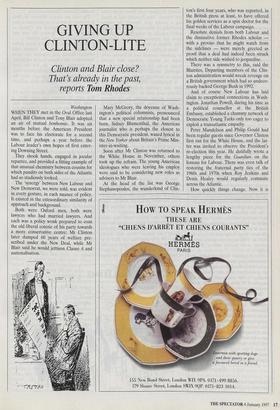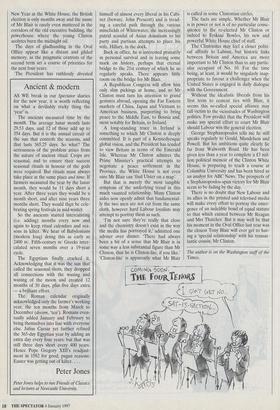GIVING UP CLINTON-LITE
Clinton and Blair close?
That's already in the past,
reports Tom Rhodes Washington WHEN THEY met in the Oval Office last April, Bill Clinton and Tony Blair adopted an air of mutual bonhomie. It was six months before the American President was to face his electorate for a second time, and perhaps a year before the Labour leader's own hopes of first enter- ing Downing Street.
They shook hands, engaged in jocular repartee, and provided a fitting example of that unusual chemistry between cousins for which pundits on both sides of the Atlantic had so studiously looked.
The 'synergy' between New Labour and New Democrat, we were told, was evident in every gesture, in each nuance of policy. It existed in the extraordinary similarity of approach and background.
Both were Oxford men, both were lawyers who had married lawyers. And each was a policy wonk prepared to coax the old liberal coterie of his party towards a more conservative centre; Mr Clinton later dumped 60 years of welfare pre- scribed under the New Deal, while Mr Blair said he would jettison Clause 4 and nationalisation. Mary McGrory, the doyenne of Wash- ington's political columnists, pronounced that a new special relationship had been born. Sidney Blumenthal, the American journalist who is perhaps the closest to this Democratic president, waxed lyrical in the New Yorker about Britain's Prime Min- ister-in-waiting.
Soon after Mr Clinton was returned to the White House in November, others took up the refrain. The young American ideologues who were leaving his employ were said to be considering new roles as advisers to Mr Blair.
At the head of the list was George Stephanopoulos, the wunderkind of Clin- ton's first four years, who was reported, in the British press at least, to have offered his golden services as a spin doctor for the final weeks of the Labour campaign.
Resolute denials from both Labour and the diminutive former Rhodes scholar with a proviso that he might watch from the sidelines — were merely greeted as proof that a deal had indeed been struck which neither side wished to jeopardise.
There was a symmetry to this, said the Blairites. Departing members of the Clin- ton administration would wreak revenge on a British government which had so undeco- rously backed George Bush in 1992.
And of course New Labour has laid claim to exceptional connections in Wash- ington. Jonathan Powell, during his time as a political counsellor at the British Embassy, established a chummy network of Democratic Young Turks only too eager to exploit a transatlantic empathy.
Peter Mandelson and Philip Gould had been regular guests since Governor Clinton first ran for the White House, and the lat- ter was invited to observe the President's re-election this year. He dutifully wrote a lengthy piece for the Guardian on the lessons for Labour. There was even talk of restoring the fraternal party ties of the 1960s and 1970s when Roy Jenkins and Denis Healey would regularly commute across the Atlantic.
How quickly things change. Now it is New Year at the White House, the British election is only months away and the name of Mr Blair is rarely even muttered in the corridors of the old executive building, the powerhouse where the young Clinton acolytes burn the midnight oil.
The days of gladhanding in the Oval Office appear like a distant and gilded memory, as the pragmatic centrists of the second term set a course of priorities for the next four years.
The President has ruthlessly divested himself of almost every liberal in his Cabi- net (beware, John Prescott) and is tread- ing a careful path through the various minefields of Whitewater, the increasingly putrid scandal of Asian donations to his party and partisan attempts to place his wife, Hillary, in the dock.
Back in office, he is interested primarily in personal survival and in leaving some mark on history, perhaps that eternal bridge to the 21st century of which he so regularly speaks. There appears little room on the bridge for Mr Blair.
A Republican Congress will allow him only slim pickings at home, and so Mr Clinton must turn his attention to grand gestures abroad, opening the Far Eastern markets of China, Japan and Vietnam to American business, purporting to bring peace to the Middle East, to Bosnia and, most notably for Britain, to Ireland.
A long-standing truce in Ireland is something to which Mr Clinton is deeply committed. It is part of a Kennedyesque global vision, and the President has tended to view Britain in terms of the Emerald Isle. Whereas Mr Clinton admires the Prime Minister's practical attempts to negotiate a peace settlement in the Province, the White House is not even sure Mr Blair can 'find Ulster on a map'.
But that is merely the most tangible symptom of the underlying trend in this much vaunted relationship. Many Clinton aides now openly admit that fundamental- ly the two men are not cut from the same cloth, however hard Labour loyalists may attempt to portray them as such.
`I'm not sure they're really that close and the chemistry doesn't exist in the way the media has portrayed it,' admitted one adviser over dinner. 'There had always been a bit of a sense that Mr Blair is in some way a less substantial figure than Mr Clinton, that he is Clinton-lite, if you like.' `Clinton-lite' is apparently what Mr Blair is called in some Clintonian circles.
The facts are simple. Whether Mr Blair is in power or not is of no particular conse- quence to the re-elected Mr Clinton or indeed to Erskine Bowles, his new and powerful White House chief of staff.
The Clintonites may feel a closer politi- cal affinity to Labour, but historic links between Britain and America are more important to Mr Clinton than to any partic- ular occupant of No. 10. For the time being, at least, it would be singularly inap- propriate to favour a challenger when the United States is engaged in daily dialogue with the Government.
Without the idealistic liberals from his first term to cement ties with Blair, it seems this so-called special alliance may fall victim to the vicissitudes of Washington politics. Few predict that the President will make any special effort to court Mr Blair should Labour win the general election.
George Stephanopoulos tells me he still speaks regularly to Gould, Mandelson and Powell. But his ambitions quite clearly lie far from Walworth Road. He has been given less than a year to complete a mil- lion political memoir of the Clinton White House, is preparing to teach a course at Columbia University and has been hired as an analyst for ABC News. The prospects of a Stephanopoulos-spun victory for Mr Blair seem to be fading by the day.
There is no doubt that New Labour and its allies in the printed and televised media will make every effort to portray the emer- gence of an indelible bond of equal stature to that which existed between Mr Reagan and Mrs Thatcher. But it may well be that his moment in the Oval Office last year was the closest Tony Blair will ever get to hav- ing a 'special relationship' with his transat- lantic cousin, Mr Clinton.
The author is on the Washington staff of the Times.



























































 Previous page
Previous page